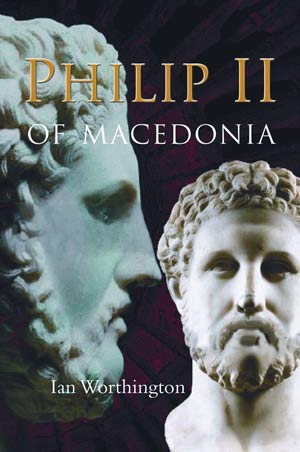
Alexander the Great of Macedonia is one of the most exciting and controversial figures of antiquity. Probably only Jesus Christ is more famous from the ancient world. Alexander was only 20 years old when he became king of Macedonia in 336 BC, and only 33 when he died in Babylon in 323. Yet in that time he fought hard battles against vastly superior numbers to expand the Macedonian empire from mainland Greece to what the Greeks called India (present day Pakistan), including Syria, and Egypt. Alexander was all set to invade Arabia when he died.
Alexander facilitated the spread of Greek civilization to the east, broadened contacts between east and west, brought to the Greeks a sense of belonging to a greater world than just the Mediterranean, and was worshipped as a god by some of his subjects while he was still alive. Perhaps it’s not a surprise that he came to believe in his own divinity, given his unparalleled conquests. He was a legend in his own lifetime, and he remains one today, as the outpouring of books about him and even movies prove.
But Alexander could not have done anything he did without the achievements of his father Philip II, who became king in 359 and ruled until his bloody assassination in 336. Because without Philip, there would have been no Alexander. Without Philip, and what he did for Macedonia politically, militarily, economically, socially and culturally, no Macedonian king would have been able to undertake the bold venture of invading Asia.
“In Philip’s defeat of 353 the seeds of Macedonian imperialism were sown.”
Philip II of Macedonia did not conquer on the scale Alexander did. And so Philip is not the household name that Alexander is. But Philip changed the course of Greek history forever, and he made Macedonia a superpower in the ancient world. Before Philip’s reign, Macedonia was in a terrible state. With no centralized government, no army other than a weak, conscript one, no economy, no unity, the country was teetering on the brink of utter collapse. Macedonia had been victim to invasions and dynastic interference from neighboring tribes and Greek states further afield, such as Athens and Thebes. The chaos was intensified when Philip’s immediate predecessor and 4,000 troops were killed in battle, two powerful tribes massed to invade, and the Athenians and Thracians supported two different pretenders to the throne.
Philip saved Macedonia in its hour of need, and forged what would be the first nation state in Europe. He left Alexander a united Macedonia for the first time in its history, with an empire stretching from Greece to the Danube; a centralized monarchy; thriving, urban centers; a formidable, a first class army that became the best in the Greek world and advances in siegecraft that opened the way for Alexander’s great military successes; a strong economy; and the plan to invade Asia. He crushed the Greeks at the Battle of Chaeronea, ending their autonomy, and so laid the foundations of what would become the vast Macedonian empire under Alexander.
How he did all of this in a reign of only 23 years is a remarkable story. It is a combination of diplomacy, military skill, speed, ruthlessness, several polygamous marriages, and an uncanny knack of knowing what his enemies would do before they did. In battles and sieges he lost an eye, shattered a collarbone and suffered a near fatal wound in his leg, but he remained the traditional warrior king to the end. As a man, he lived hard, loved hard, and was utterly loyal to his kingdom and its position in the Greek world.
By taking into account recent archaeological discoveries and reinterpreting ancient literary sources, I tell Philip’s story in my book, and I reassess the impact of his reign. In doing so, I bring him out of Alexander’s shadow and place him where he properly belongs: in the centre stage of Greek history.
For example, I argue that Philip had no imperialistic ambitions when he first came to power in 359 but was solely concerned with border security and the unification of Macedonia, given how these problems were a plague to Macedonia. As he began to achieve both of these, and in the process kick-started the Macedonian economy, he was forced to redefine any policy he had towards the Greeks when he was defeated by an army of the central Greek state of Phocis in 353. Phocis had seized Delphi, home of the oracle of Apollo, and sparked off a sacred war as the other Greek states fought to liberate it and the god. The defeat caused many in Philip’s army to desert, and its repercussions almost undid everything he had achieved to date. His return to Greece the following year was not just for revenge; he had decided to exploit this sacred war to bring about a settlement in central Greece that would make Macedonia a power with which to be reckoned. Hence, he and his men returned wearing white laurel wreaths to show they had come as Apollo’s saviors.
Thus, I argue, in Philip’s defeat of 353 the seeds of Macedonian imperialism were sown. And I further argue this was a new age in Philip’s relations with his army after its surprising desertion. From now on, he needed to keep it on campaign and winning, so in many respects he had little choice but to intervene actively in Greek affairs. Philip had become as dependent on the army as it was on him. That meant he had little choice when he finally conquered Greece but to look elsewhere – to Asia.
I also argue that in his relations with Greece Philip always intended to curb the influence of Thebes, and that this was the product of personal reasons, stemming from the time he was held hostage in Thebes as a young teenager. His complicated courtship of Athens, the reasons for which have caused much scholarly ink to be spilled, had nothing to do with the Athenians’ culture or the need of their fleet for his invasion of Persia. Philip had simply chosen to neutralize the power of Thebes, and that meant championing the position of Athens in Greece. Personal reasons rather than purely political or strategic, lie at the heart of his dealings with Greeks.
Philip was assassinated in 336. While the circumstances of his death are not controversial (we know a member of his bodyguard killed him with a dagger), the motives are. I argue that Philip’s fourth wife, Olympias, and her son Alexander, the future Alexander the Great, had something to do with Philip’s demise. I connect the incident to Alexander’s question to the oracle of Zeus Ammon in the Libyan desert in Egypt five years later as to whether the murderers of his father had been punished. This is a very odd question to ask so long after the events unless some mud was still sticking to Alexander.
Equally controversial is the final resting place of Philip. Was it really Tomb II in the royal tombs found at Vergina (the ancient Aegae), which were discovered in 1977, or a different tomb? If not Philip II in Tomb II, who might those remains belong to? Based on a thorough analysis of the arguments for or against, and especially on the forensic evidence form the skeletal remains found in that tomb, I put forward the only conclusion there can be: this was Philip’s tomb.
“I tell Philip’s story in my book, and I reassess the impact of his reign. In doing so, I bring him out of Alexander’s shadow and place him where he properly belongs: in the centre stage of Greek history.”
Without Philip, then, Greek history would have been entirely different. So too would the history of Macedonia throughout the ages and into modern times. As my book argues, without the army that Philip created, the advances in siegecraft his engineering corps oversaw, the unity he forged in Macedonia, the strength of the economy he achieved, the empire he brought about, and the plans to invade Asia, Alexander would have achieved little.
This argument also affects Alexander’s kingship: just because he is called “Great” does not mean he is. When we compare and contrast the legacies of Philip and Alexander, as I do, we see that Alexander’s reign brought to fruition what his father began – and then wrecked it. His legacy, compared to that of his father, is woeful, and about as “un-great” as it can get.
The historical Alexander should be reassessed, as should Philip’s place in Greek history, and perhaps it is Philip who deserves to be called “Great.”


Ian Worthington is Frederick A. Middlebush Professor of History at the University of Missouri-Columbia. He taught for ten years in the Classics departments at the Universities of New England and of Tasmania in Australia before moving to Missouri in 1998. He has published fourteen sole-authored and edited books and over eighty articles on Greek history, epigraphy and oratory, including, most recently, the biographies Alexander the Great: Man and God (2004) and Philip II of Macedonia (2008), as well as the Blackwell Companion to Greek Rhetoric (2006). He is currently writing a book on Demosthenes, editing the Blackwell Companion to Ancient Macedonia, and is Editor-in-Chief of Brill’s New Jacoby, a new edition, with translations and commentaries, of 856 fragmentary Greek historians involving a team of 112 scholars in 16 countries (published in biannual installments, 2007-2013). He has convened a number of national and international conferences, and founded the biennial Orality and Literacy in Ancient Greece conference series as well as the biennial Fordyce Mitchel Memorial Lecture Series. In 2008 he finished filming a course on the ancient Greek world for The Teaching Company. In 2005 he won the Chancellor’s Award for Outstanding Research and Creativity in the Humanities, and in 2007 the Student-Athlete Advisory Council Most Inspiring Professor Award, both at the University of Missouri-Columbia.